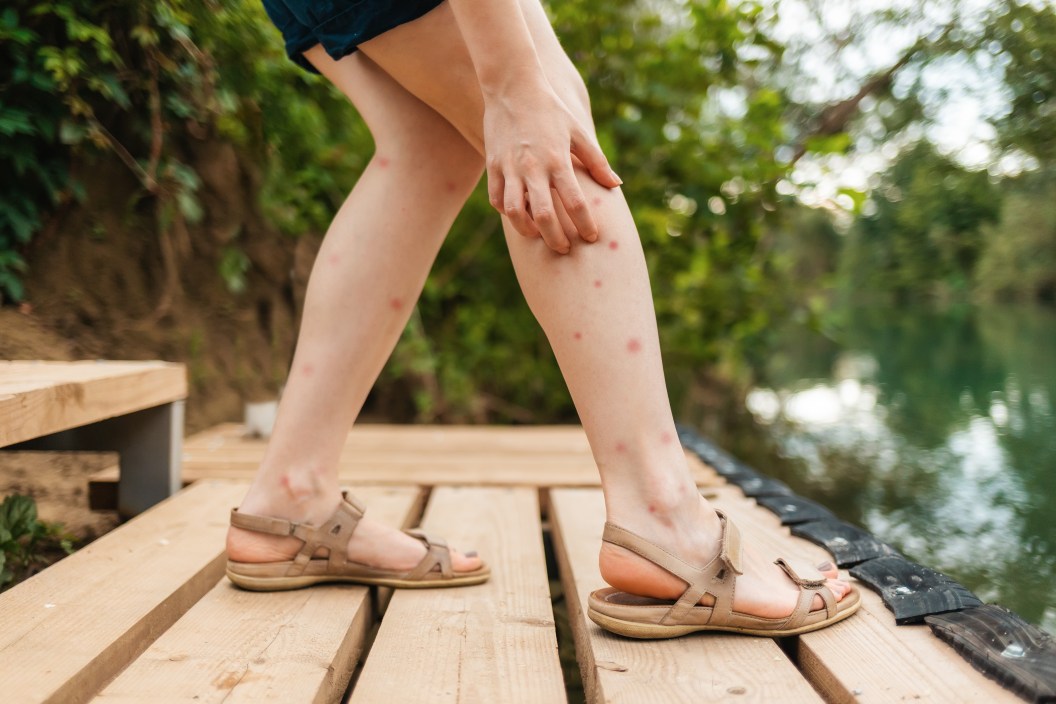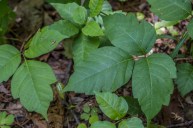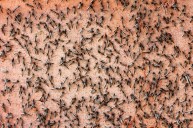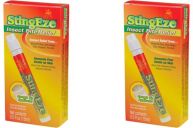One minute you're enjoying your evening outside when out of nowhere comes that dreaded humming sound of a mosquito and then moments later: that unmistakable itch and round, red bump.
Getting mosquito bites is, unfortunately, par for the course of being outdoors. And one or two—even a dozen—mosquito bites, we can deal with. But when you're camping, hunting, or fishing near a breeding ground of still water and suddenly, the whole mosquito army seems thirsty for a bite of you, well, the aftermath can be painful to say the least.
When you get bitten from head to toe, in addition to being uncomfortable, you're also put in a sticky situation: All you want to do is itch, but if you scratch the bite and break the skin, now you're at risk for infection, Michael Zimring, M.D., Director of The Center for Wilderness and Travel Medicine at Medical Center in Baltimore, told Wide Open Spaces.
Mosquito bites also can cause swelling, redness, small blisters, and dark spots that resemble bruising. Some people, especially those with weakened immune systems, can experience extra symptoms, such as hives, swollen glands, or low-grade fever. In extreme cases, a mosquito bite can even trigger anaphylaxis, a potentially life-threatening situation that causes throat swelling, hives, and wheezing, according to the American Academy of Allergy, Asthma, & Immunology.
But for the average person, they're simply an itchy nuisance—and easily treatable. Here's your guide for mosquito bite treatments when you get bit head-to-toe.
READ MORE: Finally—Scientists Know Why Mosquitoes Like Certain People More
Mosquito Bite Treatments at Home
"Treating the actual bites is about comfort," Dr. Zimring says. But if you can stop the itch, you're not only alleviated of the constant irritation, but also don't have to worry about scratching the bite open.
If you're covered in itchy mosquito bites you can take a head-to-toe approach to treatment.
- Take a cool shower or oatmeal bath. Both cold water and the properties in oatmeal can soothe the itchiness and reduce any swelling.
- Pat your body dry. Try not to rub while toweling off, as this has a similar effect as scratching and might stimulate the itch again. Instead, pat or dab dry.
- Dab the affected area with an anti-itch lotion. Your best options are calamine lotion, an over-the-counter antihistamine cream (such as Benadryl), corticosteroid cream, or a homemade paste made of baking soda and water. Even dabbing on a natural remedy, such as aloe vera, or raw honey, could help. (But be sure to wait until going back inside to try the raw honey treatment, as it could attract more insects!)
- Reduce pain by applying an after-bite gel.
- Spot treat itchy spots with a cold compress. This allows you to leverage the soothing properties of a cold shower. DIY a cold compress at home by soaking a washcloth in cold water. Make it even colder by sticking it in the freezer for a few minutes. Or, swap out a cold washcloth with a bag of frozen vegetables. You can also rub the area with an ice cube. Sometimes even simply applying pressure without adding a cold element can help to soothe an itchy bite.
- Reapply creams, pastes, or gels three times a day or until the area is healed.
- Take an oral antihistamine, for more severe reactions to mosquito bites. These include cetirizine (Zyrtec), loratadine (Claritin), diphenhydramine (Benadryl), and fexofenadine (Allegra).
Your bites should stop itching on their own in a few days.
Mosquito Bite Treatments in the Backcountry
Half the time we're covered in itchy, irritating bites, we still have a few more days left to suffer getting eaten up away from civilization and a helpful shower or bath tub. In this case, the best best mosquito bite treatment is a combination of cold compresses and an antihistamine, says Dr. Zimring.
Simply soak an (ideally clean) cloth (e.g., bandana, buff, sock) in whatever cold water you can find and apply as needed.
Additionally, if you were prepared, you'll have brought one of the topical lotions listed above (calamine lotion, Benadryl cream, after-bite gel); apply that liberally.
How to Prevent Mosquito Bites
The real trouble with mosquito bites isn't the itching and irritation, but the very serious diseases that mosquitoes can carry, including Zika, Chikungunya virus, and Malaria, Dr. Zimring says. And as climate change creates hotter areas, populations of disease-carrying mosquitos will rise throughout North America, he adds. In fact, The Centers for Disease Control and Prevention recently confirmed five cases of locally acquired malaria in the U.S. — the first time in twenty years that the disease has been contracted in the U.S.
"Preventing bites is the best way to avoid disease," Dr. Zimring says. Of course, it's not possible to prevent every mosquito bite, but he recommends looking for two key ingredients found in mosquito repellents: picaridin and permethrin.
Picardan is a synthetic formula that mimics a natural repellent found in pepper plants that can be applied directly to skin or on clothing. Permethrin, on the other hand, is designed to be applied to clothing to repel insects. (There are also a number of natural mosquito repellents if you're looking for an alternative.)
In addition to repellents, Dr. Zimring suggests avoiding moist areas and eliminating any standing water — ponds, flowerpots, old tires, and any container where water could pool could all attract mosquitos, he says.
There is also some evidence that mosquitos are attracted to certain colors, including red, orange, and black, so you may want to avoid wearing these while in a known mosquito-heavy area. Colors that do not attract mosquitos include green, purple, blue, and white.
And heads' up: "Mosquitos in general usually bite at sundown and throughout the night," Dr. Zimring said, so you'll want to take extra precautions after sundown.
READ MORE: Malaria Confirmed in Florida and Texas—Should We All Be Worried?




